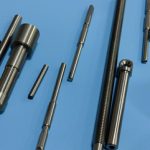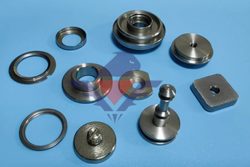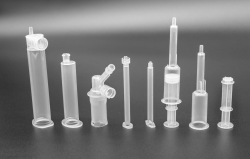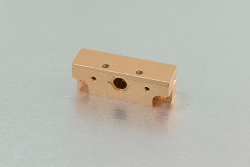Medical Precision Machining
Medical manufacturing refers to the production and distribution of medical devices, equipment, and supplies used in the healthcare industry. It involves a complex process that includes the design, development, testing, and production of medical products. This includes a wide range of products such as surgical instruments, prosthetics, diagnostic equipment, imaging systems, and drug delivery systems.
At Falcon Swiss Machine Shop, One of the key advantages of Swiss machining is its ability to produce parts with high accuracy and consistency. This is especially important in medical manufacturing, where precision is critical to ensure the safety and efficacy of medical devices.
4 Main Ways of Medical Device Machining at Falcon
1. 5 axis machining
Falcon 5-axis machining process is particularly suited for the machining of high-accuracy, intricate geometries and can significantly improve processing efficiency and reduce processing time. Five-axis machining has wide applications in industries such as aerospace, automotive, medical, and defense.
2. Swiss machining
Swiss machining technique is particularly suited for long and slender parts for medical devices. Our CNC Swiss machining service can maintain exceptional precision and repeatability, making it ideal for high-volume production runs that require consistent quality and accuracy for the medical industry.
3. Micro machining
Micro machining is a critical process in the production of miniature components used in medical applications. It involves the use of precision tools and machines to create small parts with intricate geometries and tight tolerances.
4. Sinker EDM and WEDM
Sinker electrical discharge machining (EDM) and wire EDM (WEDM) are advanced machining processes that utilize electrical discharges to remove material from workpieces. Sinker EDM is ideal for producing complex shapes with sharp internal angles and deep ribs, making it well-suited for the fabrication of high-precision medical components.
Falcon Capacities of Medical Parts Machining & Manufacturing
(1) 300+ Equipment: Falcon has 300 + production and testing equipment: mainly CNC lathes, machining centers (including not limited to Japan TSUGAMI, Taiwan King, etc.), traditional turning and milling, welding, internal and external grinding, surface grinder and EDM (mid-running and slow-running wire); Testing equipment includes spectrograph (ROHS), OES, CMM, projector, altimeter, height gause, etc.
(2) Accuracy: The general accuracy our machine can control is ±0.01mm, and the limit accuracy is ±0.001mm. Precision gear machining module in the range of 0.3-15, size 0-1000mm, DIN 5-9 accuracy.
(3) Processing Capacity: Falcon has accumulated a lot of project experience in mass processing. We can produce at least 1,000,000 pieces in one month, providing one-stop service from one-off prototypes to millions of units for customers in all industries.
(4) Surface treatment: Falcon has at least 30 types of surface treatments. We can meet the specific types of surface treatment requirements of medical customers, such as corrosion protection, rust prevention, etc. Commonly processed surface treatments include anodization, plating, polishing, etc.
4 Keys about Falcon of Medical Manufacturing Quality and Assurance
1. We maintain international certifications such as ISO 9001:2015 and ISO 16949 to save new customers of our high-volume medical parts from the third-party audit costs that come with choosing a more powerful supplier like Falcon.
2. PPAP Compliance: PPAP is used for quality control in the production process of medical devices or components. Falcon provides PPAP to medical industry customers to verify that our engineers have correctly understood all requirements of the customer’s engineering design records and specifications. This also proves Falcon’s strong supply capacity to continuously meet these requirements during actual production.
3. Process FMEA: Falcon’s engineering team carefully analyzes the potential failures and consequences of parts and production processes according to the FMEA process after receiving customer drawings. Necessary measures are taken in advance to help medical industry customers avoid all risks before formal production, improving product quality and reliability.
4. AQL Inspection Standard: AQL stands for ACCEPTANCE QUALITY LIMIT. The choice of quality level is a focus of attention for both suppliers and customers. As a compliant supplier, Falcon is proficient in strictly sampling and inspecting batch products’ quality according to the quantity of medical parts batches and the customer’s inspection level requirements. So far, our produced medical parts have a high probability of passing the AQL standard, up to 99.99%. AQL has different sampling quantities for different requirements, and our medical customers usually use general level II standards for appearance inspection and special inspection S4 standards for size sampling. Refer to the AQL page for detailed standards and inspection quantities.




























































